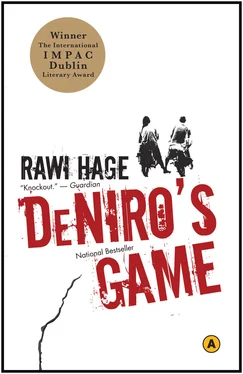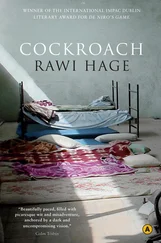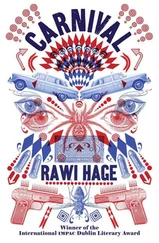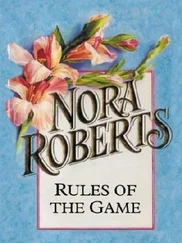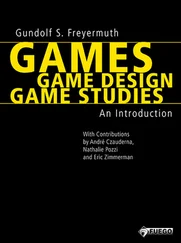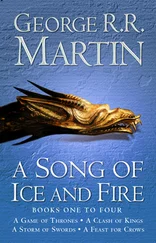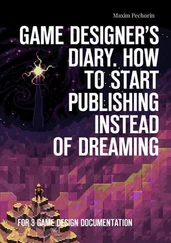In Dawra, I waited until he parked his car. He went inside a baker’s store and came out with a lahm ba’ajin in his hand. He unwrapped the newspaper around his food and took a few bites, then walked to his apartment. When he entered the building I followed him up the stairs. As he arrived on the landing between two floors, I grabbed him from behind and twisted his shoulder, and once his face was exposed to me I hit him with my head (I was still wearing the helmet that, I hoped, would make me appear to him like a spaceman from a B movie). He fell on the stairs and moaned, his hands on his bleeding nose, his eyes bloodshot. I searched his pockets, pulled out money, put it in my jacket, and walked away and around the block. I found my motorcycle and drove it back home.
When night came again, like it always does, I dressed in black and smudged my face and hands with black shoeshine liquid. I lit a candle in the window on the street side of my apartment and locked my door. I wore a hat that covered my curly hair, a hat long enough to hide my wide eyes, a hat that concealed me from nights, birds, and the grocer’s eyes. I crossed the street to the building opposite. All is in opposition, I thought: cities, guns, friends, and foes. I went straight up to the building’s roof. Slowly and calmly I opened the heavy metal door, gently closed it behind me, walked to the edge of the roof, and sat and eyed the street below. I watched the light that shone and danced in my window.
A car drove by once, slowly, then came back again, turned off its headlights, and stopped in front of my house. I rushed down the stairs with my gun in my hand. I hid in the entrance and watched Najib and his accomplice, who had a bandage on his puffy blue face and wrapped around his broken nose. They looked toward my window. They appeared childish, clumsy, scared, hesitant. I stood there, like a vindictive ghost in a squeaky attic restraining his accusing finger from pulling the trigger, restraining himself from reaching an invisible arm inside his enemies’ throats to extract their last breaths. Najib and his friend whispered to each other, and then suddenly they drove away and did not return.
I went back to the roof and thought of George. I had almost killed George, my childhood friend, my brother who stabbed me and kissed me, and who kissed my lover long enough to leave me. . I have to leave this place, I thought; I have to leave this place. I pulled all my money from my pocket, and counted it again, and wrapped elastic around it to make a round, fat bundle.
I walked to the other side of the roof and watched Rana’s house. Her window was dark. I swung the gun around in every direction, waving it at the vacant water-barrels, the dancing partridge bird, the whistling bombs, waving it in Rana’s direction and in mine. I looked the gun in the face and I thought of the many ways to leave: The ghost could twist your arm and squeeze the trigger in your face, and if you’re lucky, my friend, he will push you over the roof and wait for the partridge bird to carry you back up, and he will chase the falling rockets back to the Nevada desert, or to the ticking Big Ben, or to the bent Pisa tower. Or you might hold the cooing partridge tight, and dive into the sea, and hunt for poison fish and a few snapping clams. Or you might gracefully catch a cruise ship by its sails and swing it to its own mambo tune, careful not to spill champagne on the tourists’ evening gowns while shooting water guns on migrating, sexless Byzantine angels. Or you might well trap sailors’ ghosts in water bubbles, and watch them burst on the surface, and drown them again. Or you might slay underwater nymphs, collect their tiny green jackets, roll them like grape leaves, like the money in your pocket, like Persian carpets aired on white balconies.
Or you might just walk down the empty stairs, back to your flickering candle, and get some sleep.
IN THE MORNING, I heard a knock at my door. It was Monsieur Laurent. He looked distressed, and his eyes were red.
Your friend George came to visit me last night and acted like an animal, Monsieur Laurent told me. He wanted more money. I gave him what I usually give him, but he said that he wanted more. Then he took Bébé by the hand and left, and they have not come back since. He was hostile, very hostile. Could you look for him, please? I couldn’t sleep all night.
Monsieur Laurent, I said, I am not George’s agent. George asked me to do him a favour the other night when I brought you what you needed. If I had known what it was all about, I wouldn’t have delivered the bag to you.
George was very hostile, Monsieur Bassam, pleaded Laurent. I even think he was a little high. He is asking for a lot of money now. He threatened me. Il faut qu’on quitte cet endroit. C’est devenu vraiment dangereux ici. I guess this is my destiny to be an exile, always an exile. Could you please look for George and Bébé? I just want to see mon Bébé .
Did you check George’s house, Monsieur Laurent?
No. I am afraid your friend might get angry. C’est un fou. S’il te plaît , go look for them.
I asked Monsieur Laurent to have a seat while I went inside to change. I brushed my teeth and splashed my face with a handful of water. I walked to the bedroom and put my pants and shirt on. On my way out to the living room I held my jacket with my finger and slipped my hand in the jacket’s sleeve. Monsieur Laurent held the second shoulder and helped with the other sleeve.
I walked out of the apartment and down the street, and Monsieur Laurent followed me. Then he rushed to walk beside me. Abou-Dolly, the grocer, passed us. He ignored me, but turned his face to Monsieur Laurent, and they both nodded politely to each other.
At George’s place, I knocked on the door. Laurent stayed down by the entrance, pacing with his cigarette, coughing an old man’s cough.
I banged on the door again. Finally Bébé opened it, half-naked, half-asleep.
Is George here?
Non, il n’est pas là.
Where is he?
He left.
Your husband is downstairs looking for you.
Ah, oui! Loulou est là? Barefoot, she rushed down the stairs.
When Laurent saw his wife, he coughed some more, threw the cigarette on the pavement, and walked toward her.
Bébé, Bébé.
Mais, ça va, mon amour, ç a va, Nicole said, and she caressed Laurent’s blond hair.
J’ai pas dormi.
Oui, mais ça va . Nicole held his hand and kissed his cheeks.
While the two of them were downstairs talking, I entered George’s home and went to his room. Beside the bed, there was a thin needle and a burnt spoon; his rifle was lying in the corner. The place smelled of fumes and medicine. A lace bra was on the floor. I walked to the kitchen; the dishes were dirty and filling the sink. I glued my lips to the faucet; the water was weak, about to die and become extinct. I ran the last drops down my throat. They tasted of the air in the pipes.
I went back down the stairs. Bébé was rushing up, into George’s house.
Je viens, papa, je serai là dans cinq minutes, j’apporte mes affaires.
Downstairs, Laurent held my hand and tried to kiss it. I pulled it away fast.
Merci, merci , he repeated like a servant as I walked past him. When I reached the sidewalk, I stepped on Monsieur Laurent’s cigarette and put out its fire.
On my way home, I passed by Romanoce, the magazine store owner, and picked up a newspaper. The headlines: Israel moving on the southern borders. Fighting in the mountains between the Christians forces, the Muslims, and the socialist forces. Long, empty speeches by ministers and clergymen. A model or Hollywood actress marries a Saudi millionaire. Woody Allen plays the clarinet. Saheeb Hamemeh declares his love to an Egyptian actress . Meanwhile, Romanoce wondered if I would ever buy the newspaper, or would read it and put it back on the rack like I usually did.
Читать дальше
